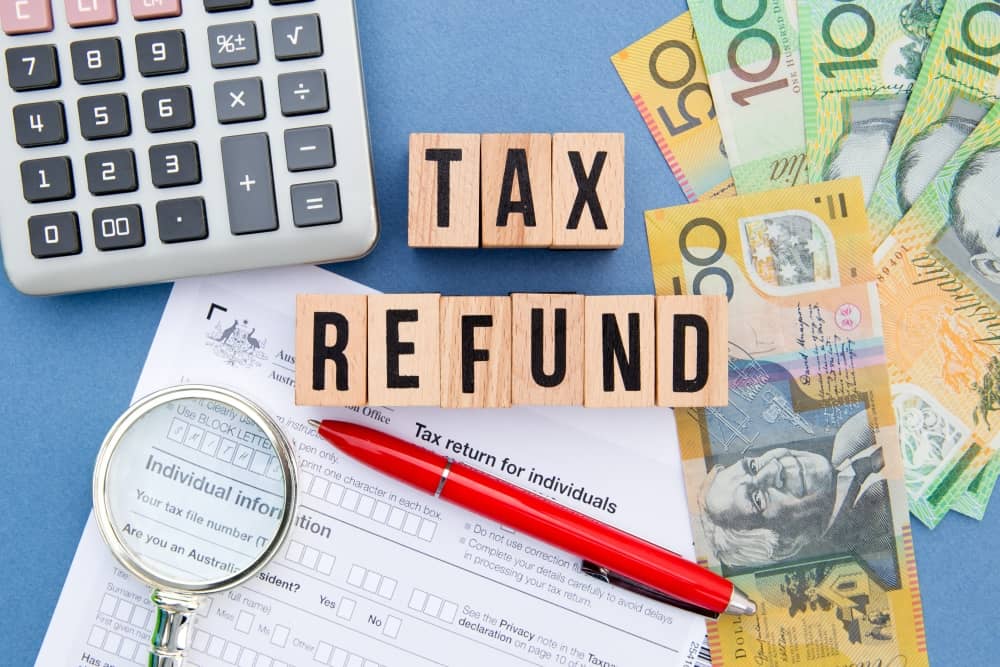Have you ever gotten your tax return back hoping for a decent sum only to be disappointed by how low it is? Or worse yet, ended up owing money to the government?
There are a variety of reasons you may be left asking, “Why is my tax return so low?”.
In this guide, I’ll go over reasons your tax return is low and how to ensure you aren’t surprised next time you lodge your return.
I know tax season can be overwhelming, so my goal is to make this guide as straightforward as possible so you can feel confident you are getting the maximum tax refund you are eligible for.
Why Is My Tax Refund So Low?
Reasons Why Your Tax Return Could Be Lower
The biggest reason I see people asking, “Why is my tax refund so low?” is due to the Low-Middle Income Tax Offset (LMITO) being removed in 2023.
LMITO was a temporary tax reduction offset offered by the government intended to provide relief to individuals earning low to average incomes. Without the LMITO, low and middle-income earners will now generally pay more tax and get a lower refund, up to $1,000 less in some cases.
You can learn more about the removal of LMITO and how it will impact your tax refund in my guide here: Bidding Farewell to the LMITO: What It Means for You.
Another reason you may have asked yourself, “Why is my tax refund so low” is if you double-claimed the tax-free threshold.
Here’s an example:
Emma begins a new job and checks “claim the tax-free threshold for this job” even though she also claimed the tax-free threshold on her first job. Now, the first $18,200 earned at both of Emma’s jobs is being calculated tax-free. Come tax time, she’ll have to make up this difference because she wasn’t paying enough tax each week.
If you work two or more jobs during the year, double-check that you only claim the tax-free threshold on one. I recommend checking with your employer if you aren’t sure. And remember, you can usually claim the tax-free threshold on your highest-earning job.
Factors That Can Affect or Lower Your Tax Return
Here are more possible reasons you may be wondering, “Why is my tax return so low?”.
Employer Issues
A portion of each paycheck you receive is taken out to be applied to taxes. If your employer doesn’t take enough out of each paycheck about your income, you may end up owing money at the end of the year. Or, if you receive overtime wages that push you into a higher tax bracket, you may end up receiving a smaller refund than you anticipated.
Freelance, Side Income, or Sole Trader Work
If you run your own business or have a side job for additional income, then you need to take your total revenue, also known as “assessable income” into account. Your assessable income determines how much you’ll owe in taxes at the end of the year.
As an employee, you automatically have a portion of your wages taken out to go toward taxes. However, if you run your own business or do freelance work, you do not have to pay taxes immediately on that income. At the end of the year, you’ll be responsible for paying the taxes you owe on that income when you file a return.
If you do a lot of freelance work or have a side gig, I recommend setting aside at least 30 per cent of your income. When you lodge your tax return, you’ll have money saved up to be able to pay the taxes you owe on your freelance/sole trader income.
Changes to Your Circumstances
If you had children, got married, or had other significant life changes, you will likely notice changes to your tax refund.
Increase In Income
In Australia, you are exempt from paying taxes if you earn less than $18,200 (the tax-free threshold).
If your income goes up and you exceed this threshold, you are no longer exempt from paying taxes and will not get the full amount back that you were used to receiving when filing your return.
If you get a promotion or take on a higher-paying job, you’ll be taxed at a higher rate and be responsible for paying more in taxes. This may result in receiving a lower tax refund.
Mistakes on Your Tax Return
If you make mistakes on your tax return, you may end up asking yourself, “Why is my tax return so low?”.
Common mistakes on tax returns include:
- Failing to declare assessable income (examples include allowances, bank interest, capital gains, rental income, untaxed government payments, dividends from shares, etc.)
- Claiming deductions you aren’t entitled to
- Lacking the necessary paperwork to claim work-related deductions (learn more in my article here: Can I Claim Tax Deductions Without a Receipt?)
- Lodging the tax return late
The Australian Taxation Office (ATO) will correct any mistakes and hold the taxpayer responsible for any money owed. In some cases, the taxpayer may face financial penalties or interest charges for an erroneous or late tax return.

Government Agency Debts
The ATO has the authority to intercept your tax refund and use it to settle your debt with any government agency or organisation you owe money. If there is a remaining balance, the ATO will send it to you.
For example, Jill lodges a tax return and is expecting a $2,200 tax refund. However, when she gets her refund, it is only $1,300.
Jill wonders, “Why is my tax return so low?” but then realises she owes the Family Assistance Office $900. The ATO paid this debt using her tax refund and sent her the remaining balance of $1,300.
If you have any outstanding debts to government agencies, I recommend making it a priority to pay them off so you don’t have any surprises come tax time.
Medicare Levy Surcharge
If your income exceeds a certain level and you don’t have eligible private health insurance, you may face an additional tax, The Medicare Levy Surcharge (MLS). This will result in a lower tax refund or potentially a tax bill.
HECS-HELP Debt or Other Student Loans
If you reach a certain income level, you’ll be required to start repaying your HECS or HELP debt. If your employer is not informed that you need “HELP or HECS repayment” withheld from your salary, it may result in a tax bill at the end of the year.
Division 293 Tax
If your income and concessional super contributions equal over $250,000, you may need to pay Division 293 tax.
Lump Sum E-Back Payments
Lump Sum E back payments are payments made by an employer if there has been a delay or error in your pay. These one-time payments can move you into a higher tax bracket, causing you to be taxed at a higher rate than usual and resulting in a lower refund amount. I recommend learning about the “Lump Sum E Tax Offset” if this scenario applies to you.
Recent Australian Tax Law Updates and Regulations
As mentioned earlier, the biggest factor that can affect your tax return is the removal of the Low-Middle Income Tax Offset (LMITO). Many Australians will notice a decrease in their tax refund this year as a result of the removal of the LMITO.
Other reasons you may notice a lower tax return this year include changes to how deductions can be claimed by individuals working from home. The biggest update is that the 80c-per-hour shortcut method and the 52c-per-hour fixed rate are no longer applicable if you work from home.
Now, taxpayers must use the actual cost method or the revised fixed rate method to calculate their deductions.
How Can I Recover from a Low Tax Refund and Make the Most Out of My Tax Return?
If you want to file an accurate return and lodge it on time and get the maximum tax refund you are entitled to, I recommend keeping good records throughout the year, saving receipts related to work-from-home deductions, lodging your return promptly, using the ATO’s tax withheld calculator to make sure you are having the appropriate tax amount withheld from your weekly paychecks.
To get the maximum tax return you are entitled to, consider working with a tax professional, especially if you work multiple jobs or have several income sources.
I see people miss so many valuable deductions that could have gotten them a higher tax return. So if you want to take the hassle out of tax season and make sure you are getting all of the tax deductions you are eligible for, contact our dedicated team of tax professionals.
Contact us by emailing support@taxreturn.com.au, phoning 0499 829 829 (0499 TAX TAX), or filling out our online contact form. Our friendly team is here to answer your questions or help you get started finding all of the tax deductions you are eligible for.



